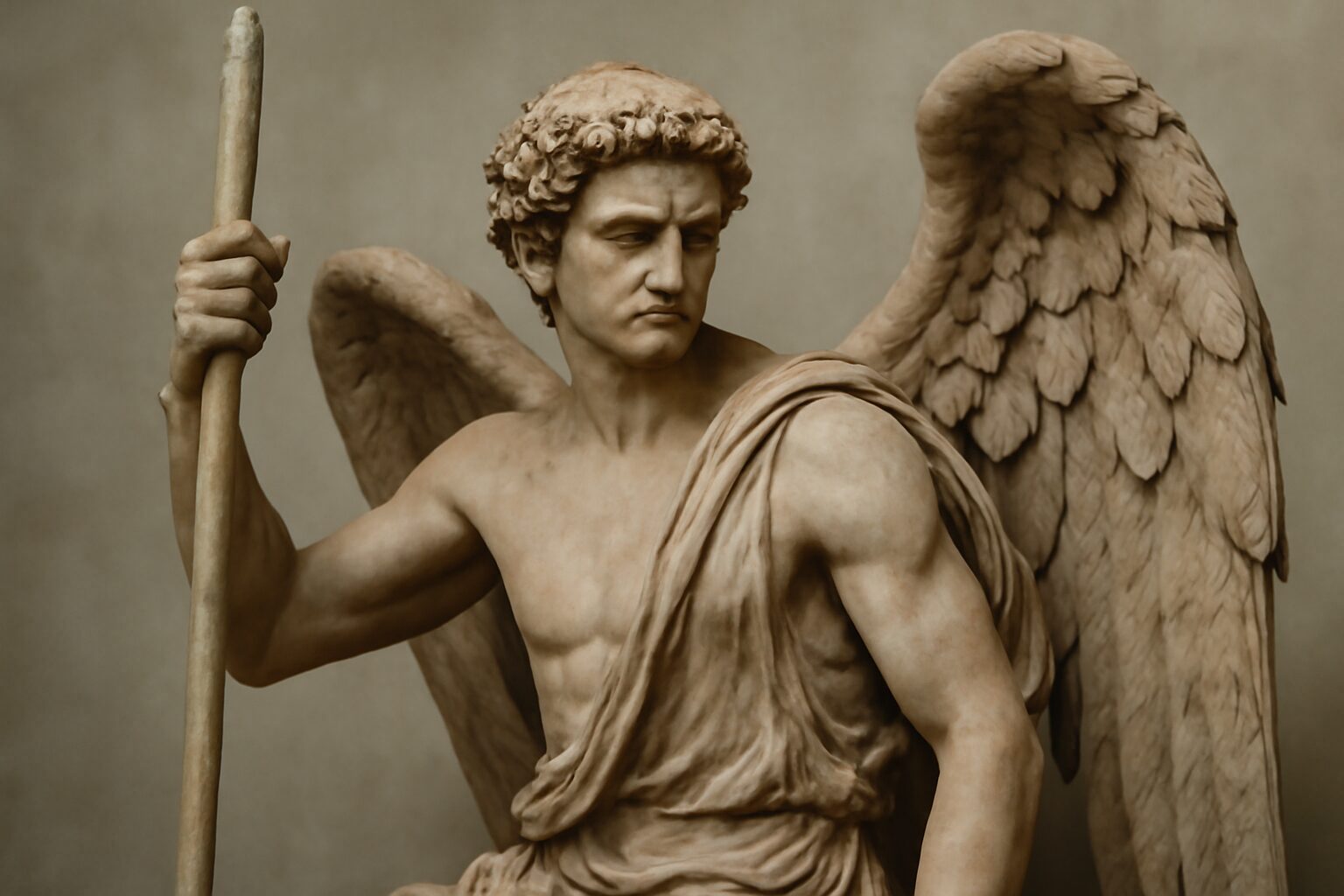Zelos: The Personification of Rivalry and Zeal
In Greek mythology, Zelos (Greek: Ζῆλος) is the divine embodiment of rivalry, emulation, zeal, and dedication. As one of the lesser-known but fascinating figures in the pantheon, Zelos represents the competitive spirit that drives mortals and gods alike to excel, often serving as both an inspiration and a force of tension.
Origins and Family
Zelos was born as one of the winged Daimones, spirits who personified abstract concepts. He was the son of the Titan Pallas and the Oceanid Styx, making him the sibling of Nike (Victory), Bia (Force), and Kratos (Strength). Together, they were loyal allies of Zeus during the Titanomachy, the great war between the Titans and the Olympians.
Role and Symbolism
Zelos was not just a passive deity—his presence was felt in the heat of competition. He embodied the burning desire to surpass others, whether in athletic contests, artistic endeavors, or even warfare. Unlike Eris (Strife), who sowed discord, Zelos represented a more constructive form of rivalry, pushing individuals to achieve greatness through dedication.
In art, Zelos was often depicted with wings, symbolizing the swift and relentless nature of ambition. He was sometimes shown alongside his siblings, reinforcing their collective role as enforcers of Zeus’s will.
Relationships and Influence
Zelos and his siblings were constant companions of Zeus, standing by his throne as reminders of the qualities needed to maintain power. His relationship with Nike was particularly significant—where Zelos drove the competitive spirit, Nike crowned the victor with glory.
Though not as widely worshiped as major Olympians, Zelos’s influence was pervasive. Athletes, warriors, and even poets invoked his name, seeking the fire of determination to outshine their rivals.
Legacy in Myth and Culture
While Zelos lacks many standalone myths, his presence was crucial in shaping the Greek worldview. The Greeks valued agon (competition) as a driving force in society, and Zelos personified this ideal. His legacy endures in modern words like "zeal" and "zealous," reflecting his timeless connection to passion and ambition.
Alternative Names for Zelos
God Name: Invidia (Roman)
In Roman mythology, Invidia is the equivalent of Zelos, representing envy and jealousy. The Romans often adopted Greek gods but gave them Latin names and slightly different attributes.
God Name: Phthonos (Greek)
In Greek mythology, Phthonos is closely associated with Zelos and sometimes used interchangeably. Phthonos specifically personifies envy and spite, often linked to the negative aspects of rivalry.
Tales about Zelos
The Unyielding Rivalry: Zelos and Nike
In the celestial realms, Zelos, the personification of zeal and rivalry, often found himself in the shadow of his sister Nike, the goddess of victory. While Nike was celebrated for her triumphs, Zelos burned with an insatiable desire to prove that his fervor was the very engine of her successes. One day, as the gods prepared for the great Olympian games, Zelos challenged Nike to a contest: whoever inspired the most mortals to achieve greatness in a single day would be acknowledged as the true force behind victory.
The Contest of Inspiration
Nike descended to the mortal world, bestowing her blessings upon athletes and warriors, ensuring their victories were swift and glorious. Zelos, however, took a different approach. He whispered into the hearts of artisans, poets, and farmers, igniting a fierce competitive spirit that drove them to surpass their limits. By sunset, while Nike had crowned many winners, Zelos had sparked innovations, masterpieces, and bountiful harvests through sheer rivalry. The gods deliberated and declared that without Zelos's zeal, victory would be hollow; thus, they were forever intertwined, one fueling the other.
The Embers of Creation: Zelos and Hephaestus
Deep within the forges of Mount Etna, Hephaestus, the god of fire and craftsmanship, toiled endlessly, creating wonders for gods and mortals alike. Yet, he often worked in solitude, his efforts driven by duty rather than passion. Zelos, observing this, grew restless; he saw potential for greatness stifled by complacency. One evening, Zelos approached Hephaestus and stoked the embers of his forge with whispers of rivalry, challenging him to create a weapon that could outshine even the lightning bolts of Zeus.
The Forge of Ambition
Hephaestus, initially dismissive, felt a spark of Zelos's fervor ignite within him. For days, he worked with unprecedented zeal, experimenting with metals enchanted by the Cyclopes and cooled in the waters of the Styx. Zelos stood by, fanning the flames of competition, reminding Hephaestus of the glory that awaited. The result was the Aegis, a shield so magnificent that it became a symbol of divine power. From that day, Hephaestus embraced Zelos's spirit, and his forges burned brighter, fueled by the eternal flame of rivalry and ambition.
Frequently Asked Questions
Who is Zelos in Greek mythology?
Zelos is the Greek personification of rivalry, competition, and zeal. He is one of the winged daimones (spirits) and is often associated with the drive to excel and compete, especially in athletic or heroic endeavors.
What are daimones in Greek mythology?
Daimones (or daemons) are minor deities or spirits in Greek mythology that personify abstract concepts, emotions, or forces of nature. Unlike major gods, they often represent specific aspects of human experience, such as love, fear, or rivalry.
Why is Zelos important in Greek myths?
Zelos represents the competitive spirit that was highly valued in ancient Greek culture, especially in sports, warfare, and personal achievement. His presence highlights the Greek belief in the importance of striving for excellence and glory.
How does the concept of Zelos apply today?
The idea of Zelos as a driving force for competition and ambition is still relevant today. It mirrors modern values like perseverance, motivation, and healthy rivalry in sports, business, and personal growth.
What can we learn from Zelos and other daimones?
Zelos and other daimones teach us how the ancient Greeks understood human emotions and behaviors as divine influences. They show how abstract ideas were given form and meaning, helping people navigate challenges like competition, love, or fear.













